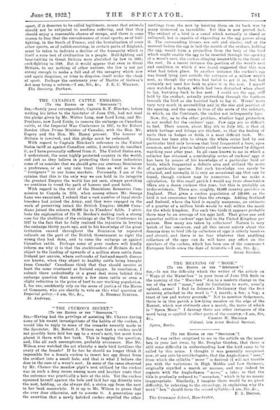" THE CUCKOO'S SECRET."
(To THE EDITOR Or THE " SPECTATOR.") SIR,—Having had the privilege of assisting Mr. Chance during some of his recent investigations of the habits of the cuckoo, I would like to reply to some of the remarks recently made in the Spectator. Mr. Robert J. Wilson says that a cuckoo could not possibly have laid her egg in a wren's nest, but must have placed it there with her beak. This is begging the question, and, like all such assumptions, probably erroneous. Has Mr. Wilson ever watched the act whereby a male bird fertilizes the ovary of the female? If he has he should no longer think it impossible for a female cuckoo to insert her egg direct from the oviduct into a small hole, and that is what I believe she does in the case of a wren's nest. In some of the cases observed by Mr. Chance the meadow pipit's nest utilized by the cuckoo was in such a deep recess among moss and heather roots that the entrance was practically a hole at the side. Yet the cuckoo squeezed herself against the hole and laid her egg directly into ' the nest, holding, as she always did, a stolen egg from the nest in her beak meanwhile. It is up to Mr. Wilson to prove that she ever does otherwise, not to assume it. A generation ago the assertion that a newly hatched cuckoo expelled the other nestlings from the nest by hoisting them on its back was by many dismissed as incredible. Yet this is now proved fact. The oviduct of a bird is a canal which normally is closed or collapsed, but is capable of expanding as the egg passes along it. The surrounding tissues are soft and elastic, and at the moment before the egg is laid the mouth of the oviduct, holding the egg, would form a projection from the body of the bird which might enable the egg to be inserted through the opening of a wren's nest, the cuckoo clinging meanwhile to the front of the nest. In a recent instance the position of the wren's nest and condition in which it was found suggested that this was what had taken place. In another instance the cuckoo's egg was found lying just outside the entrance of a willow wren's nest, as though the cuckoo had failed to get it in, but had certainly not used her beak to place it in the nest. I myself once watched a turkey, which had been disturbed when about to lay, hurrying back to her nest. I could see the egg, still held by the oviduct, actually protruding through the feathers beneath the bird as she hurried back to lay it. Wrens' nests vary very much in accessibility and in the size and position of the opening, and the same is true of the nests of the redstart, in which, on the Continent, the cuckoo not infrequently lays.
Now, Sir, as to the other problem, whether legal protection is not needed for the cuckoos' eggs. Few eggs are so difficult to find. Their season, about May 5th to July 5th, is that at which herbage and foliage are thickest, so that the finding of nests then in hedges or fields is a most difficult task. Mr. Chance has been able to obtain the whole series laid by one particular bird only because that bird frequented a bare, open common, and her precise habits could be ascertained by diligent watching year after year. In all cases known to me in which a collector has obtained a considerable series of cuckoos' eggs it has been by means of his knowledge of a particular bird or birds, which frequented a definite area and utilized the nests of a particular species. But such knowledge can rarely be obtained, and normally it is only an occasional egg that can be found, though cuckoos may he numerous. Let me make a calculation. In this small parish 1 would say from observation there are a dozen cuckoos this year, but this is probably an under-estimate. There are, roughly, 10,000 country parishes in England. That gives a cuckoo population of .120,000, as the bird is not commoner here than the average. Adding Scotland and Ireland, where the bird is equally numerous, an estimate of a quarter of a million birds would be well within the mark for the whole kingdom. For each two birds it appears probable there may be an average of ten eggs laid. That gives one and a-quarter million cuckoos' eggs laid in the United Kingdom per annum. How many are taken by collectors? Nature is very lavish of her resources, and all this recent outcry about the damage done to bird life by collectors of eggs is utterly baseless and absurd, and there is no fear whatever that anything collectors of the eggs can do will have any effect on the numbers of the cuckoo, which has been one of the commone,t European birds since the days of Aristotle.—I am, Sir, &c., ALLAN ELLISON.


































 Previous page
Previous page